Is It ADHD or Cancer-Related Cognitive Impairment? Understanding the Overlap and Key Differences
Last week, we discussed Cancer-Related Cognitive Impairment. Yet, you might be wondering: Is it CRCI or ADHD?
Maybe you’ve found yourself forgetting what you were just saying, rereading the same paragraph five times, or feeling scattered in a way that’s unfamiliar—and frustrating. You start wondering:
“Is this ADHD? Is it chemo brain? Am I just stressed? What’s happening to me?”
If you’ve gone through cancer treatment—or are currently navigating survivorship—it’s not uncommon to experience cognitive changes that feel a lot like ADHD. The overlap can be confusing, even for professionals. So how do you know what’s really going on?
Let’s unpack it—gently, clearly, and without shame.
Briefly, What Is Cancer-Related Cognitive Impairment (CRCI)?
Cancer-Related Cognitive Impairment, sometimes referred to as “chemo brain,” describes the thinking and memory challenges that can happen during or after cancer treatment. It can impact:
Memory
Focus and attention
Processing speed
Word-finding
Organization and planning
CRCI is most often linked to chemotherapy, but it’s also seen with radiation, immunotherapy, hormonal treatments, and the stress of the cancer experience itself. For more on CRCI, see last week’s post.
What Is ADHD?
ADHD (Attention-Deficit/Hyperactivity Disorder) is a neurodevelopmental condition that typically begins in childhood, though many adults go undiagnosed until later in life. ADHD affects:
Sustained attention
Task initiation and completion
Impulse control
Working memory
Time management and organization
Adult ADHD doesn’t always look “hyperactive”—it often shows up as distractibility, forgetfulness, procrastination, mental fatigue, and difficulty prioritizing.
Where ADHD and CRCI Overlap
People with either condition may report:
Trouble concentrating or staying on task
Forgetting appointments or misplacing things
Feeling mentally foggy or overwhelmed
Difficulty planning, organizing, or managing time
Emotional frustration related to underperformance
In day-to-day life, this can feel nearly identical.
Key Differences to Consider
While symptoms overlap, there are a few clues that can help tease apart ADHD and CRCI:
1. Timing of Onset
ADHD is lifelong—symptoms usually start in childhood or adolescence, even if they become more noticeable in adulthood.
CRCI typically begins after a cancer diagnosis or during/after treatment.
If these cognitive challenges are new and began around cancer treatment, CRCI is more likely.
2. Consistency of Symptoms
ADHD symptoms tend to be relatively stable over time, even if the severity fluctuates.
CRCI symptoms may improve gradually over time, especially after treatment ends.
3. Emotional Context
CRCI often coexists with trauma, grief, medical anxiety, and fatigue—all of which can intensify cognitive symptoms.
ADHD is often accompanied by a long history of academic/work challenges and feeling “different” or “behind.”
4. Family History
ADHD often runs in families.
CRCI does not—it’s specific to a cancer experience.
Can You Have Both?
Yes—and some people do. ADHD is underdiagnosed, especially in women and adults. For those with undiagnosed ADHD, the stress of cancer treatment can worsen preexisting symptoms or bring them into sharper focus.
A comprehensive assessment with a psychologist can help explore whether ADHD may be present underneath—or alongside—CRCI.
What Can You Do?
Whether you’re dealing with ADHD, CRCI, or something in between, you’re not alone, and you’re not broken. Cognitive challenges can be addressed with:
Executive function support (tools to manage time, memory, organization)
Therapy, especially Acceptance and Commitment Therapy (ACT) to reduce shame, increase self-compassion, and clarify values
Mindfulness-based practices to improve attention and reduce stress
Medical consultation (especially for ADHD evaluation or cancer follow-up care)
Final Thoughts
It’s human to want answers when something doesn’t feel right. If you’re struggling with memory, focus, or feeling mentally foggy, your experience is real and worthy of care—regardless of the label.
Whether it’s ADHD, cancer-related cognitive impairment, or both, you deserve support that meets you where you are.
You don’t have to figure it out alone—and you don’t have to just “push through it.”
There is clarity. There is help. And there is a path forward.
References
Ahles, T. A., & Root, J. C. (2018). Cognitive effects of cancer and cancer treatments. Annual Review of Clinical Psychology, 14(1), 425–451. https://doi.org/10.1146/annurev-clinpsy-050817-084903
American Psychiatric Association. (2022). Diagnostic and statistical manual of mental disorders (5th ed., text rev.; DSM-5-TR). https://doi.org/10.1176/appi.books.9780890425787
Asher, A., & Myers, J. S. (2015). The effect of cancer treatment on cognitive function. Clinical Advances in Hematology & Oncology, 13(7), 441–450. https://pubmed.ncbi.nlm.nih.gov/26353040
Biederman, J., Petty, C. R., Evans, M., Small, J., & Faraone, S. V. (2010). How persistent is ADHD? A controlled 10-year follow-up study of boys with ADHD. Psychiatry Research, 177(3), 299–304. https://doi.org/10.1016/j.psychres.2009.12.010
Dawson, P., & Guare, R. (2016). The smart but scattered guide to success: How to use your brain’s executive skills to keep up, stay calm, and get organized at work and at home. Guilford Publications.
Myers, J. S. (2012). Chemotherapy-related cognitive impairment: The breast cancer experience. Oncology Nursing Forum, 39(1), E31–E40. https://doi.org/10.1188/12.ONF.E31-E40
PDQ® Supportive and Palliative Care Editorial Board. PDQ Cognitive Impairment in Adults with Cancer. Bethesda, MD: National Cancer Institute. Updated 11/25/2024. Available at: https://www.cancer.gov/about-cancer/treatment/side-effects/memory/cognitive-impairment-pdq. Accessed 08/15/2025
Ramsay, J. R., & Rostain, A. L. (2016). The adult ADHD tool kit: Using CBT to facilitate coping inside and out. Routledge.
Willcutt, E. G. (2012). The prevalence of DSM-IV attention-deficit/hyperactivity disorder: A meta-analytic review. Neurotherapeutics, 9(3), 490–499. https://doi.org/10.1007/s13311-012-0135-8
Portions of this post were generated with the assistance of AI to support clarity and organization. All content was reviewed and edited by me to ensure clinical accuracy, alignment with current research, and sensitivity to the experiences of those navigating cancer-related cognitive changes and/or ADHD.
